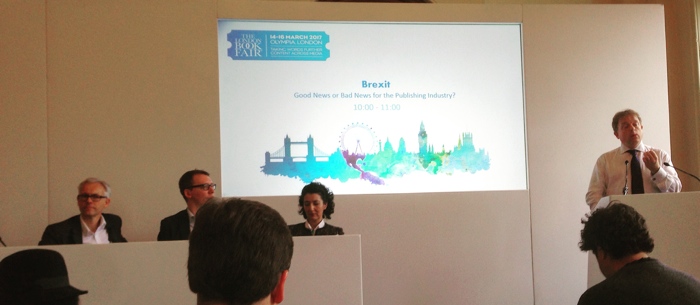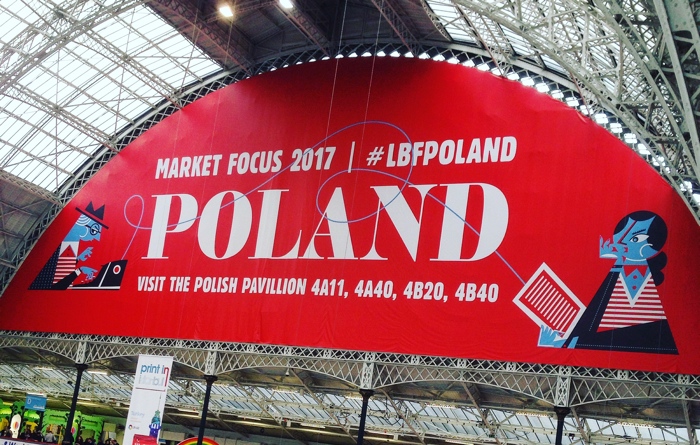Brexit: What does it mean for the publishing industry?

Ah, Brexit. Glorious opportunity to Make Britain Great Again, or xenophobic act of national self-harm? That was the question posed (albeit not in those exact words) at a session at this year’s London Book Fair.
[rt_reading_time label="Reading Time:" postfix="minutes" postfix_singular="minute"]
The actual wording of the question was: “Brexit: Good News or Bad News for the Publishing Industry?” And (spoiler alert) the answer from delegates in the packed Olympia Room, by my assessment of room capacity and show of hands at the end, was a resounding “Bad News” – by a margin of 140-0.
It was quite a week, Brexit-wise. The session took place the day after the Article 50 bill was passed by Parliament, allowing Prime Minister Theresa May to start the process to take the UK out of the EU. Article 50 was triggerered earlier today.
It was also the day after Scottish First Minister Nicola Sturgeon announced her intention to hold a second independence referendum. The Scottish Parliament passed that bill yesterday. May dismissed this as game playing, which made first my irony meter explode, and then Twitter when I said as much. (Honestly – I tweet this sort of thing all the time – it never usually gets this sort of reaction.)
“Politics is not a game,” says Party who took UK out of EU over a power struggle and treated it as a public school jape. #indyref2 #Brexit
— Jon Reed (@jonreed) March 13, 2017
So, in the middle of a Twitter storm and a room full of publishers, I listened patiently for reassuring words from the woman from the Department for International Trade as we embark on this unnecessary and masochistic scuttling of the country. It felt like scripted optimism with few answers.

Rosa Wilkinson (the woman from the DIT) was joined by Ian Hudson, CEO of DK Publishing and Nick Hillman, Director of the Higher Education Policy Institute and former chief of staff to Higher Education Minister David Willetts.
The session was chaired by Stephen Lotinger, Chair of The Publishers Association. In August 2016 they published a manifesto based on a survey of members’ key concerns and priorities called Brexit: Implications for the UK publishing industry, which you can download from the PA website.
Lotinger opened with a few facts: the UK publishing industry is the largest in the world, a £4bn industry employing over 230,000 people. He went on to say it’s “diverse, open and international,” and “not just another business: we nurture and invest in authors.” Members of the panel, and members of the audience, raised concerns about protecting this industry, and were met with a sympathetic, if impotent, “we’re listening.”
Listening mode
Rosa Wilkinson was director of innovation at the Intellectual Property Office (IPO) for five years, before taking a communications role at the newly-created Department of International Trade in August 2016. In her 30-odd yrs in and around Whitehall, she said she “can never remember such a fervent time in Government.” She had a tough sales job as the only positive voice in the room but, as she announced on Twitter when she started the job, she said her role was to listen.
@prweekuknews Reaching out to stakeholders to hear what they need from the UK’s trade policy. Success starts with listening.
— Rosa Wilkinson (@RMW136) August 12, 2016
“We’re spending a lot of time at the fat end of the funnel,” she explained in the session, “trying to understand all the implications of Brexit, what it means for the economy.” Some might say it would have been wise to think about all that before the referendum – but we are where we are. And it’s as well someone is scrambling to do this. Even the Brexit Secretary, David Davis, admits the Government has made no assessment of the economic impact of leaving the EU without a trade deal.
The DIT is “thinking through what our world needs to look like when we have left the EU,” she went on to say, “what are the processes, systems, regulatory environment?” Their ambition is to “deliver a world in which we see a thriving, prosperous UK and we avoid disruption wherever we can. We will only achieve that by listening.”
Keeping as much as possible
Part of the plan for avoiding disruption involves “keeping it simple” – and keeping as much legislation as possible, at least for now.
Wilkinson said a good first step as we leave the EU is the transporting into UK law of legislation that currently flows down from the EU – something known as the Great Repeal Bill – the “most poorly-named document ever, because it’s about bringing things into UK law instead of repealing them.” But it comes with a long-term aim – from the next parliament onwards – of deciding whether to keep, repeal or replace this legislation on a case-by-case basis.
Another key part of the DIT’s remit is to “help the Department for Exiting the EU deliver the very best trade deal with the EU.” It remains to be seen how successful that will be, but we already know that, by definition, it won’t be as good as the trade deal we have now. And trade deals with the EU take a long time. The recent EU-Canada deal took seven years to negotiate, and runs to 15,000 pages.
Yet, once we have finally left the EU, we will have immediate access to briliant trade deals with the rest of the world – or so we are told. But how to achieve this? We already (finally) have a trade deal with Canada through our membership of the EU. But in two years this will no longer apply to us, and we will have to start our own trade negotiation.
Wilkinson sees the solution as “looking at how we can grandfather across EU trade deals, such as the one with Canada, to bilateral trade deal with UK.” While the UK is not allowed to start trade talks until we have actually left the EU, at the end of the 2-year process that starts today we can have discussions. The DIT has “set up a number of working groups – with the US, Australia, New Zealand and India – looking at imports as well as exports.” It is looking at what we need to include in those trade deals, and prioritising which countries matter most to us.
EU free trade agreements (FTAs) are in force in around 30 countries in total. Wilkinson hopes we can transition all of those across to UK law.

Publishing and the EU trade negotiations
In the Q&A session at the end, Lotinger asked: “How might publishing be treated within the forthcoming trade negotiations?” Wilkinson responded by saying that, at the moment, trade policy is set for us by the EU with us informing that and feeding into it. The EU has agreed schedules with the World Trade Organization (WTO) which defines both terms and tariffs associated with EU. She outlined a two-step process:
- Transition WTO schedules into UK law. First we will transition across EU WTO schedules in to UK law. Which is “straightforward and simple – or sounds it until I tell you there’s a technical process associated with it that must be agreed by 180 WTO members.” Can it be done within 2 years? “Actually, yes,” says Wilkinson. “The other WTO members don’t want to see disruption any more than we do.” Then the UK/EU deal will “start from position of convergence.”
- Negotiate based on trade surplus. Secondly, “lets look at the bald economics,” she said. The EU operates a £60bn trade surplus with the UK. This is not evenly shared across the EU or across sectors. This “gives us a good negotiating hand before we kick off. Businesses across Europe don’t want their pan-European supply chains disrupted.” Yet “one of the challenges we face is making the case for trade.”
“We are leaving EU, we’re not leaving the planet,” Wilkinson explained. “We will continue to have discussions with business sectors around the world.”
One area where the UK excels is in intellectual property (IP) infringement. The UK hosted the first ever IP crime sumit, and “will continue to help businesses protect their IP,” she promised.
Publishing – a global business
While the DIT is professionally optimistic that Brexit will be good for us all in the long run, most publishers take a different view. Dorling Kindersley is a good example of a truly global trade company, with 163 different languages, with 1,000 employees around the world, 500 of whom are in London. Of those 500, 81 do not hold British passports. Their international publishing team speak 22 languages between them, and all are fluent in at least two. 75% of revenue comes from outside the UK.
Chief executive Ian Hudson said we may or may not like the outcome of EU referendum. “Socially, culturally and in terms of political standing in the world we will be poorer,” he continued, “but it’s far from clear that we will be worse off economically. We need to be clear about what we want from Brexit.”
The challenges Brexit poses to DK are similar to those faced by many other publishers. Hudson itemised them as follows:
- Economy. The weaker pound has significantly increased printing costs, and cost of maintaining international offices. The uncertainty of fluctuating currency is also unhelpful, as people need to commit to international deals well ahead of time.
- Talent. Diversity of talent is crucial to the development of the UK as a creative society. Diversity and creativity go hand in hand. We need to be able to retain and recruit European and international talent to help us develop books that do well in international markets.
- Free trade. Any hindrance to free trade will undermine business, make us less competitive and impact on author incomes. Trade barriers destroy economic value – just look at the effect trade barriers have had on the economy of Argentina.
- Copyright / intellectual property. The loss of our seat at the EU table in influencing copyright legislation is a backward step. Over many years we have been a voice of reason that has helped deliver copyright frameworks that work. We have lost that voice but need to find alternative ways to influence the debate.
- Loss of funding. EU grants for e.g. translations will impact particularly small and academic publishers.
However, Hudson went on to say Brexit needn’t all be bad news: the weaker pound means overseas revenues already translate to a higher value in sterling than previously. And the removal of EU policy limitations will make it easier for the UK Government to set its own policy, whether VAT on ebooks or copyright generally.
He set out a 7-point list of things they want to see at DK:
- EU citizen rights. An immediate commitment to guarantee the rights of EU citizens living in UK – so that our 81 non-British EU colleagues working in London have some assurance of their status in the UK.
- No cut-off date. The same commitment for anyone who chooses to arrive between now and Brexit – so we can have confidence in recruiting.
- International recruitment. The right to be able to offer a job in publishing to anyone (internationally) going forward.
- Free trade. The UK Government to commit to the principles of free trade – don’t want to tax or limit imports and don’t want exports taxed or limited. We had that in EU – why should we not have the same opportunities now?
- Copyright. The UK Government to build a robust intellectual property framework. It doesn’t have a good track record here, especially in combating piracy.
- Replacement for funding. Where EU grants and funding are lost from the EU, DK would like the UK Government to step in and provide finding for research, translations, and to support smaller publishers.
- A continued relationship. It behoves UK publishers to continue to build on the wonderful pan-European relationships we have had for many years in European publishing. What binds us together is our ability to bring great writing, illustration. photography to European market.
Lotinger asked Hudson what he is doing at DK. Hudson said there is an element of wait-and-see, but they are also being proactive: he is speaking at events like this one, to try and influence the debate; and they are “speaking to staff regularly – taking their interests very, very seriously.”
DK is part of German multinational Bertelsman, which “has absolutely stated its commitment to its businesses in the UK. We want to give confidence to our teams, exploit opportunities as they arise, but need to be very careful about exchange rates. We don’t know how the long term economics will play out.”
Emotion is a factor as well as cold, hard business and economics. Hudson acknowledged that, “if you’re sitting in Germany, you know the UK wanted out and that can trigger a set of emotions. Businesses can play their part, but it’s the responsibility of governments to send out messages and aim for a less hard Brexit.”
The impact on higher education
Higher education and publishing are inextricably linked: something I’m accutely aware of having spent 10 years working in academic publishing, and many years since lecturing in HE.
The Higher Education Policy Institute is an independent think tank that sits between Government and higher education and tries to get them to understand each other. Director Nick Hillman spoke of his concerns for the sector.
He felt that universities “didn’t play their hand very well” during the EU Referendum. They focused too much on money (e.g. how much they would lose from Horizon 2020) and not enough on the importance of collaboration across countries. International research, for example, gets cited more often and is more influential.
Hillman spoke on four issues: freedom of movement, implications for research, remaining competitive and maintaining funding.
1) Freedom of movement. This is an issue for both students and staff. HEPI’s assessment is that EU students coming to UK will fall by 57% – if they have to pay international fees and are no longer entitled to tuition fees. There will be a 31,000 decline in EU student numbers, but 20,000 more international students would come because of the lower pound, resulting in a net loss of 11,000 students. But revenues would generally higher because everyone would be paying international fees.
But staff will also be affected by new restrictions on freedom of movement. In the Russell Group universities alone there are 20,000 EU staff. Are they going to leave? They will currently be considering their positions – some will stay, some will go.
2) Implications for research. Chancellor Philip Hammond has promised over £5bn of extra research spending – which is good but doesn’t fill the gap in EU funding. Hillman cited an Elsevier study that “showed unequivocally that the UK has a stronger breadth of research than any other country of its size.” This is a position that could be put at risk as we leave the EU – though he did think there were some research areas – space tech, nano tech and clinical trials – that could be better post-Brexit.
3) Remaining competitive. How do we ensure that UK universities remain competitive post-Brexit? Hillman hoped Rosa Wilkinson would be able to dissuade Home Secretary Amber Rudd from having another crackdown on international students, as she threatened at the last Conservative Party Conference.
4) Maintaining funding. Hillman reminded us that the very fist Leave campaign video promised we would get as much science and research funding as we would as members of the EU. He said “we need to hold the Government’s feet to the fire on this.”
In the Q&A, Wilkinson said there’s “not a bottomless pit of funds – we need to make sure that we match EU funding smartly and affordably.”
I wouldn’t count on matched funding. My view is that reminding the Leave camp of cash they promised is unlikely to have much effect, given how quickly and casually they abandoned their campaign promises, including the infamous £350m per week for the NHS pledge. This now just provokes eye-rolling from Brexiteers, as if we should all have known that was a blatant lie that was never going to happen, and we’re all idiots for believing a slogan painted on a bus.
Damage control
The one thing that is clear is that we won’t be getting a deal anything like as good as the one we already have – despite Brexit Secretary David Davis claiming exactly that in the House of Commons in January. It’s a mind-bendingly complex process and a crazy amount of work in order to negotiate a deal worse than the deal we already have.
There is nothing to win in this process, on either side. This is about damage control.
– Donald Tusk, President of the European Council, 29 March 2017
Treaty negotiations are usually conducted with the expectation that something better will follow. With the forthcoming Brexit negotiations there is an acceptance by anyone with any grasp on reality, from Number 10 down, that we will emerge with a deal worse than what we currently have. The focus is on damage limitation, on negotiating the least worst option, the best possible deal within the constraints of the interpretted “will of the people”, a deal as close as possible to what we have now, all the while knowing that we can’t actually have it.
It’s not exactly aspirational.
Even if you believe that we will, eventually, have a better trading position with non-EU countries, the fact that we will be in a worse trading position with the EU is uncontroversial. And the EU is the world’s largest single market, a bloc of 500m people, and our biggest trading partner with whom we do half of our trade.
Bargaining chips
Economics and abstract concepts of soverignty aside, the most worrying aspect of Brexit is surely the human cost. Particularly the effect on the 3m UK residents who were disenfranchised from the referendum vote, yet who are most directly affected by it: non-British EU citizens, who have built lives here, work and pay taxes, but who now feel desperately unwelcome and whose status is now in question.
Rosa Wilkinson said in the Q&A: “The exit risk is understood – if people with EU passports feel unwelcome.” It feels like there is a lot of listening and understanding going on in Government – but few answers, practical solutions or reassurances.

Charlie Redmayne, CEO of HaperCollins, asked the question that was troubling many people I spoke to throughout the day. While he supports Ian Hudson’s plea for Government reassurance, he thought that that argument is probably lost for the time being. “It is already affecting businesses,” he said, using his own as an example. HarperCollins has a distribution centre in Scotland, and a significant proportion of staff there come from Eastern Europe. “Insercurity and a weak pound means they’re going home – especially the Polish staff. This is impacting on productivity, cost and the viability of that business. You should understand that not giving that reassurance to foreign nationals will impact businesses and staff.”
Rosa Wilkinson said: “we understand that this is a perfect storm. Let’s see how quickly we can get there once Article 50 been triggered.” It is telling that, while Nicola Sturgeon sought to reassure EU nationals living in Scotland in her speech the morning after the EU Referendum, Theresa May has consistently refused to do so.
You should understand that not giving that reassurance to foreign nationals will impact businesses and staff.
– Charlie Redmayne, CEO, HarperCollins
Nick Hillman reminded us that “for a lot of people the vote to leave was about migration.” He wants this sorted quickly – not just because his parents live in France (Brits in other EU countries are also affected by this citizenship limbo, of course), but “because we are talking about real people.” He spoke of academic members of staff who had children enrolled in school who were now unsure of their status. Researchers don’t know if their postdoc will have the same currency if they go home as it does in the UK. This “impacts thousands of people.”
Ian Hudson said the Government “has a responsibility to do more than respond to populist demands and explain the positive impact immigration has on our businesses.” In the tech sector, “a third of new recruits come from international markets.” If we lose EU workers, the economy “will start to hurt badly.” It’s “not just senior people in banking – it also applies to a graduate fluent in Romanian who wants to work for me in London”
I spoke to several people at the Fair who had concerns about specific colleagues, staff – even family members – who were now unsure about their status in the UK. And not just those without a UK passport. Some of these concerns were about British colleagues who happen to be married to non-British EU citizens. Many of these people are currently applying for British residency – something that is far from guaranteed, and something it had never occured to them would be necessary when they settled here, married and had children decades ago.
This is the reality of Brexit for over 3m EU citizens living in the UK – and for their British-born partners and children too.
You cannot lecture others about politics not being a game – while you are using the lives of human beings as pawns.
– Nicola Sturgeon, SNP Spring Conference, 18 March 2017
As Nicola Sturgeon said in her address to the SNP Spring Conference a few days after this session: “You cannot lecture others about politics not being a game – while you are using the lives of human beings as pawns.”
Trigger warning
So, now that Theresa May has fired the starting gun on Brexit by triggering Article 50, what can we expect?
Today the Prime Minister made a commitment to prioritising the status of non-British EU nationals living in the UK – so let’s hope some reassurance is forthcoming soon, and the nine months of uncertainty that has already affected many people’s lives doesn’t drag on for another two years.
Time will tell. There’s a lot to be negotiated and decided. Will the divorce talks and trade negotiations happen in parrallel or sequentially? Will there be a £50bn divorce bill? Will the UK refuse to pay it? And, if so, will the EU take us to The Hague?
For all the talk of taking back control, the ball is now firmly in the court of the EU27 – the 27 other countries who all have to agree, individually and collectivelly, the final Brexit deal. And each one has a veto. We’ve spent nine months discussing what sort of Brexit we want (most of that time taken up with the mantra “Brexit means Brexit”), and we can debate it at conferences – but it’s not actually up to us. It’s up to them.
It’s not just the publishing industry that’s affected, of course. Record numbers of EU nurses are leaving the NHS. The NFU is worried that British fruit and veg may rot in the fields this year, as EU seasonal workers are put off picking (why would Bulgarians and Romanians want to return to a xenophobic country that now also pays 20% less than they can earn in Germany, Holland or Belgium, due to a declining pound?) Big businesses as well as individual workers are affected. The airlines may have to leave to keep their European routes. The banks are already leaving, to protect their European trade.
Whatever you think of Brexit, these are issues that could have been addressed months ago. It is now too late. Brexit is already here. Its effects are being felt in our industry and in many others – and by the people who work in them.
Will there be a UK publishing industry in the future?
My final thought is this: while we may worry about the effect Brexit will have on the £4bn UK publishing industry, I wonder if there will even be a UK publishing industry by the time this is all over – for the simple reason that the United Kingdom itself may not exist.
Scotland and Northern Ireland voted to stay in the EU yet have, so far, been denied consultation, let alone compromise, on a Hard Brexit that no one voted for. Scottish independence is a real possibility, and some analysts are predicting that Irish reunification is now a question of when, not if.
Still. At least we’re getting an extra £350m a week for the NHS. What a time to be in publishing. What a time to be alive.



How can Nicola Sturgeon keep a straight face? She’s the one who threatened to deport EU nationals during the 2014 referendum if an independent Scotland wasn’t allowed into the EU: http://www.scotsman.com/news/politics/sturgeon-warns-europeans-could-lose-right-to-stay-1-3475453
All the scaremongering over the issue of rights of EU citizens comes from unhappy remainers. Everyone in government and on the leave side of the campaign has said unequivocally that everyone will be able to stay with full rights. Similarly, Horizon2020 research funding has been underwritten by the government. It might cost more to print books in China if the pound falls, but this could be good for the UK printing industry as we’ll do more business locally. But the bottom line is that Brexit will probably make very little difference to the publishing industry (or indeed most people) when it happens, unless it proves a catalyst for wider change across the EU.